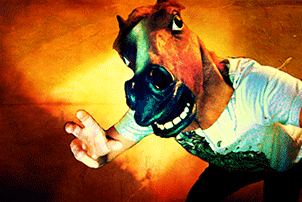
From the depths of his probably quite tastefully decorated lair, our protagonist is summoned by a radioactive W made of radium-laced doves let loose from the Warner Brothers rooftop. Wil Wheaton, ubiquitous, benign, beloved internet god, looks up from his tabletop board game, wipes the real-ale froth from his charmingly chiselled facial hair, and leaps into his Wheatonmobile. A humble yet beguiling vehicle powered by an intriguing combination of the love of intelligent and goodly folk, and the rage of anti-Wesleys, whose loathing of a fictional character (transferred to the actor) can outburn a small sun.
As the Wheatonmobile zooms into the Warner Bros car park and possibly clips a passenger-side mirror, let us cast a fond eye back on the fervent villainship of Messrs. Cooper (fictional) and Wheaton (human-all-too-human). From Arch-Nemesis, via All-You-Can-Eat-Buffet-Buddy through to Bikini-Clad Gorilla, Wheaton has gone through a peculiar transmutation. The man who (to all intents and purposes) killed his grandmother to win a Ka'a tournament, broke up Leonard and Penny to win a Bowling Match, and flaunted his “pseudo-celebrity” to queue-jump at Raiders, is now clasped in a peculiarly Sheldonic embrace of love and mild fanaticism. Except for when he has to shampoo his beard.
Given that Wheaton exists in the “real world” (that badly scripted alternate universe) as well, where he is feted for his humour, humility, and generosity, playing an utter Dickensian version of
himself (in S3&4) must be either liberating, or he’s using the show as a sort of Dorian Gray attic picture. To wit - Real Wil’s life and work flourishes, Anti-Wil cavorts in a bikini-clad gorilla-suit. TBBT exists in a suspended belief state, where Stand By Me exists, but Wheaton’s work guest starring on TBBT does not. Obviously this is a problem that affects all actors who play themselves on television, or indeed writers who smug themselves into their own novels.
The blunderbustering of the fourth wall continues with Real Wheaton posting tweets of himself antagonising Fictional Sheldon, by sitting in his spot for example. For this writer, who follows a limited number of personages, having such tweets interspersed with those of Kierkegaard and NASA, makes for a remarkably stimulating, albeit confusing experience. Like Gmork the werewolf, Wheaton appears to be able to pass between dimensions of Fantasy and Reality without becoming a Lie. Gmork, whilst ostensibly a free agent, was also working for the Forces of Darkness, which we can only presume means someone at Warner Brothers. Whether Wheaton will ultimately be used for good or evil remains to be seen, but what is certain, is that bereft of his most splendid nemesis, Sheldon has set in upon himself.
Words and "art" @MajorGripe











